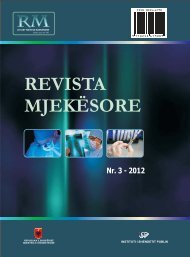in Albania - Instituti i Shendetit Publik
in Albania - Instituti i Shendetit Publik
in Albania - Instituti i Shendetit Publik
You also want an ePaper? Increase the reach of your titles
YUMPU automatically turns print PDFs into web optimized ePapers that Google loves.
INTERNATIONAL PUBLIC HEALTH CONFERENCE IN TIRANA, ALBANIALeadership communication styles: A descriptiveanalysis of health care professionals lead<strong>in</strong>g <strong>in</strong><strong>Albania</strong>n healthcare sett<strong>in</strong>gsAdriatik Gabrani 1 , Jonila Gabrani (Cyco) 2 , Elizana Petrela 1,31Department of Health Management, Faculty of Public Health, University of Medic<strong>in</strong>e, Tirana, <strong>Albania</strong>;2F<strong>in</strong>ance and Bank<strong>in</strong>g Department, <strong>Albania</strong>n University, Tirana, <strong>Albania</strong>;3Statistics Service, University Hospital Center Mother Teresa , Tirana, <strong>Albania</strong>.Context: The study of leadership <strong>in</strong> health care iscaptivat<strong>in</strong>g for many reasons. Health care leaders will<strong>in</strong>evitably have an impact on the lives of manypeople, as <strong>in</strong>dividuals rely on physicians and nursesdur<strong>in</strong>g some of the most critical moments <strong>in</strong> theirlives. Furthermore, cost constra<strong>in</strong>ts and <strong>in</strong>novationswith<strong>in</strong> organizational structure impose a greaterattention to leaders. A new leadership style is needed<strong>in</strong> which leaders engage staff, patients and partnerorganizations to improve patient care and healthsystem outcomes. There is a grow<strong>in</strong>g trend forleaders to break the old autocratic model ofleadership to newer models us<strong>in</strong>g the concepts ofshared and participatory leadership. Yet, sparseliterature exists on leadership traits orcommunication styles <strong>in</strong> <strong>Albania</strong>n healthcare sett<strong>in</strong>gs.Objective: To <strong>in</strong>vestigate and assess the leadershipstyles of leaders <strong>in</strong> health care sett<strong>in</strong>gs <strong>in</strong> <strong>Albania</strong>.Methods: Research is reported on open-endedquestionnaire from a large sample of leaders andmanagers (n=612) from a range of public healthcareorganizations. A style score was calculated and thenrelated to data on respondents biographical ageand gender. In order to compare the results, the samequestionnaire was adm<strong>in</strong>istered to the staff of thesett<strong>in</strong>g to evaluate their leaders communication style.Prelim<strong>in</strong>ary Results: Interest<strong>in</strong>g f<strong>in</strong>d<strong>in</strong>gs onleadership styles: accord<strong>in</strong>g to self-evaluation, leadersperception on their communication style resulted asdemocratic , compared to workers perceptions ontheir leaders as autocratic .Added value/Orig<strong>in</strong>ality: The relevant literatureshows that health workforce leadership is an underresearchedarea particularly <strong>in</strong> the public sector<strong>in</strong>stitutions with<strong>in</strong> health sector sett<strong>in</strong>gs. Thus, thecurrent <strong>in</strong>vestigation has contributed to improve theunderstand<strong>in</strong>g of leaders trait on this significantissue. Furthermore, the study f<strong>in</strong>d<strong>in</strong>gs are discussed<strong>in</strong> perspective of practical implications of healthmanagement system regard<strong>in</strong>g workforce issues,contra party perspectives. Overall, this studyprovides new support to previous <strong>in</strong>ternationalresearch (especially to eastern European countries)about leadership s communication style as a crucialdriver for organizational effectiveness andperformance.Keywords: communication, health care, leadership, organizational structure.ALBANIAN MEDICAL JOURNAL SUPPLEMENT63




